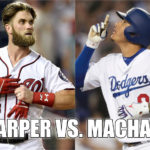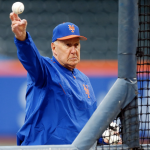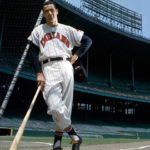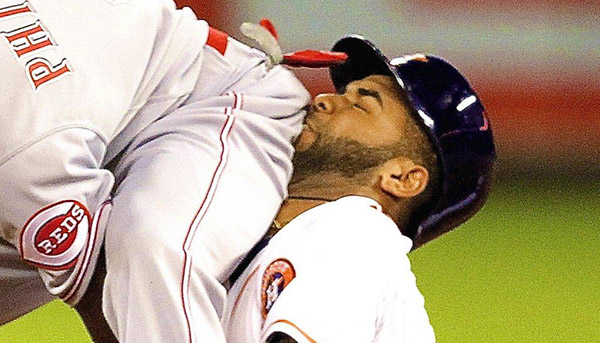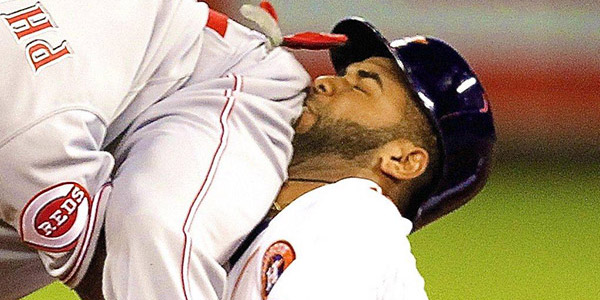From Gambling to … Gambling
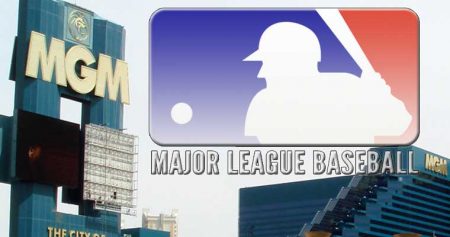 Baseball has come full circle. From gambling to … gambling.
Baseball has come full circle. From gambling to … gambling.
From its roots with professional gamblers in the earliest days of amateur baseball to its growth as a business that provided athletic thrills to paying fans, many of whom bet at the games with bookies who took bets, gambling tightened its reach around the belly of the game until the ultimate indignity, the Black Sox scandal of 1919 blew the integrity of the game wide open.
John McGraw and Ban Johnson
In between, there were other gambling scandals. One involved the rough, tough scrawny five-foot-seven inch John McGraw, manager of the New York Giants, who took on all comers, even the tall, almost reverend-like president of the American League, Ban Johnson.
The same Ban Johnson who was the driving force of the first two decades of 20th-century baseball, trying to rid the game of every last vestige of gambling and malicious play.
The bad blood between McGraw and Johnson escalated from the days before Johnson’s Western League re-formed into the American League in 1901. Their dislike of each other harkened back to McGraw’s days as a Baltimore Oriole in the 1890s when Johnson had publicly called for his suspension and derided McGraw for violent antics on the field. They continued their verbal fisticuffs throughout the first two decades of the 20th century.
McGraw did not forget. After his Giants won the 1904 National League pennant, he refused to play the American League champion Boston Americans (they later changed their name to the Red Sox), forcing the cancellation of the 1904 World Series. This was McGraw’s way of sticking his finger in Ban Johnson’s eye.
Then, in another public embarrassment, McGraw won a $400 wager that his own team, the Giants, would win the 1905 World Series. The Giants then went out and defeated the Philadelphia Athletics four games to one. McGraw won his $400 and made quite a show of it, to Ban Johnson’s annoyance.
McGraw’s wagers were yet one more way that McGraw thumbed his nose at Ban Johnson. One more jolt into the integrity of the game that had not reached a boiling point yet.
From Gambling to … Back to Gambling
Over the past 100 years, the anti-gambling sentiment of Ban Johnson and the first Commissioner of Baseball, Kennesaw Mountain Landis, turned baseball around and broke its reliance on gambling. This effectively cleansed baseball (and other related sports) of vice and corruption, ensuring the integrity of the sport for the past century.
Pete Rose learned this lesson the hard way in 1989 when he was banned from participation in any baseball-related activities for betting on games.
The lesson being that gambling and baseball do not mix, that is until the 2018 Supreme Court decision in Murphy v. NCAA that overturned Senator Bill Bradley’s Professional and Amateur Sports Protection Act of 1992.
The Supreme Court decision afforded states and other governmental bodies the right to authorize sports betting, green-lighting legalized sports betting across the United States. From gambling to … gambling.
Bradley’s Sports Protection Act was meant to protect kids from the harsh emphasis of government-sanctioned winning. Quoted in an analysis by Ronald Katz this past February in The Nation, Bradley said:
State-sanctioned sports betting puts the imprimatur of the state on this activity. It conveys the message that sports are more about money than personal achievement and sportsmanship. In these days of scandal and disillusionment, it is important that our youngsters not receive this message.
Well, the Court decided that the addictive quality of sports betting among the young was alright. How could anything that generated more commerce and money be bad? Marshall McLuhan said the message is the medium, and now, youngsters could hear the message. If it’s related to money, it must be good. Go ahead, bet the ranch on the over/under. Just don’t cry when you lose. Capitalists don’t cry.
The New Gambling
All these years later, baseball has embraced gambling once again, forming an alliance with a sports gaming outfit, MGM Resorts International.
MLB has now allowed MGM access to baseball’s official statistics feed and enhanced data analytics to create new gaming products that will facilitate wagering on games or constituent elements of games as they’re played in real-time, on personal devices, on televisions, on computers, hell, on digital watches, anywhere, anytime.
Unsurprisingly, many gambling websites and blog posts and fantasy evaluations have popped up to advise the gambling-addicted fan about the best bets of the day. For those who want more, there are myriad websites that offer educational content, suggestions to the weary, and direct access to the Las Vegas sports books for those sophisticated bettors who want more wagering flexibility.
So, if one reads the sports pages comments like down -85 cepedas appear out of nowhere. Or, the play of the day: Mariners-A’s, Over 9 ¹/₂? Or, Fantasy Baseball Trade Value: Colin Moran, Max Fried among buy-low, sell-high candidates.
There’s also a Sabermetrics stew of numbers used to buttress patterns and gambling predictions, such as The 2.86 FIP supports what he’s been doing, but his 4.37 xFIP and 4.04 SIERA point to some possible regression. His 13.3-percent infield fly-ball rate is very strong, but his 2.2-percent HR/FB rate is probably not going to be sustained.
Meaning what? In English, please.
Meaning there’s a hunger for analytical pieces among fantasy and gambling fans to give them an advantage when they bid for a player or put money on a betting proposition.
And if you’re unsure about the importance of the baseball deal with MGM, pay attention to the slickly produced MGM Resorts International commercial that runs over and over between innings on MLB.TV games. It’s all about the beauty of squandering your hard-earned dollars at MGM.
Come, stay, play, and lose. Las Vegas style. BIG.
From Gambling to … Gambling, What’s Next?
Given the paychecks baseball players earn today, it would be surprising to see players throw games for $10,000 or even $100,000. Not when they’re earning millions. Or will be earning millions soon enough. Too much to lose. And for what?
From gambling to … gambling. So, what will gambling do for baseball?
Not what it did for amateur baseball in America when it undermined the fabric of the game’s integrity. This time, perhaps, it will create motivated fans who watch games to see if the wagers they’ve made have paid off?
Perhaps.
I remember Thanksgiving years ago at my sister’s house. Before the turkey was served, we watched one of the NFL Thanksgiving games. My nephews and their father sat transfixed opposite me, staring at the large TV. I knew they all bet NFL games, especially my brother-in-law, who bet big on NFL football. All three of them were excited and pumped up as the score of a game changed, or threatened to change.
I was not moved by the NFL games. I had no skin in the game. My nephews stared at the screen like zombies. God forbid they missed anything. While one of them screamed in delight, another moaned in pain. They were not betting the same teams. There was no question they did not want to go in for turkey when my sister called everyone to the table. Only my brother-in-laws’ gentle reproach pushed them to the dining room table. But not for long.
Jerry Crasnick explains in his article about legalized sports betting in ESPN News that, “A Nielsen Sports study commissioned by the American Gaming Association found that adults who bet on the NFL watched 19 more games during the 2015 season than adults who didn’t make a wager. In addition, 84 percent of adults said they’re more likely to watch an NFL game that they previously weren’t interested in when they bet on it, while 77 percent said placing a wager made games more fun and enjoyable.”
But is that the kind of fan baseball wants to breed? Mercenary gamblers who are devoted to the sport because they can bet on home run velocity or distance or strikeouts in a game? Or the over/under? Or some other dumb statistic? Is this the way to grow new fans?
For some, that will always be enough. For others, the battle between pitcher and hitter will never suffice. In the end, what matters is what Jerry Crasnick explains in his article in ESPN News: “Based on various estimates and accounts, Americans spend between $60 billion and $150 billion annually on illegal sports gambling.”
That money is going somewhere, and baseball—that’s baseball ownership—wants more than their fair share. As they do in every revenue matter. From gambling to … gambling.
Craig Kimbrel might have just signed a three-year, $43 million contract with the Cubs, but the Ricketts family, owners of the Cubs, will probably net around $3 billion (if not more) over those same three years.
So, who’s really making the big money? Whose labor provides the financial underpinnings of the sport? The owners might skim all the profits off the top, but their labor does not create the value that is the basis of all the multimillion-dollar finances of MLB. They just retain the excess value.
Who creates that value? The players who play the game? The groundskeepers? The people who sell peanuts and beer? Or the fans who work at productive jobs, make a weekly salary, and then come to the ballpark and unload oodles of their hard earned money into the baseball machine?
Then the Ricketts family or Jim Cranes or John Henrys or Arte Morenos suck all this money up until it adds up to hundreds of millions of dollars profit a year for each franchise—even after reluctantly paying players their pittance, paying out whatever luxury taxes are owed, and whatever other local expenses there are.
And now that the Supreme Court has opened the gambling floodgates, how soon will it be before some of the real estate on the MLB.TV television screen is dedicated to online gambling choices?
MLB’s At Bat app features 28 separate interactive choices that offer fans multiple views and windows into different slices of the MLB experience. In this experience, the deliberate pace of the game can be a huge plus, allowing online players (a younger viewing demographic?) the chance to consider their choices. The slow pace might even enhance the gambling experience.
So, it’s coming. Ownership can already smell the scent of hundreds of millions of dollars of pure profit. Making ownership of an MLB franchise an even sweeter deal. What better way to leverage hundreds of millions of dollars. The only problem is the franchise. MLB’s not expanding and no ownership group is selling, though the New York Mets should be sold. The Wilpons’ screw up everything they touch.
The players have noses, too. So, ownership may have to share some of their winnings. Oh, well, into every life some rain must fall. Even the billionaires can’t always get what they want.
So, from gambling to … gambling.
More money than ever seems to have begun growing on trees outside the baseball money machine. And its gardeners are watching. Closely.

